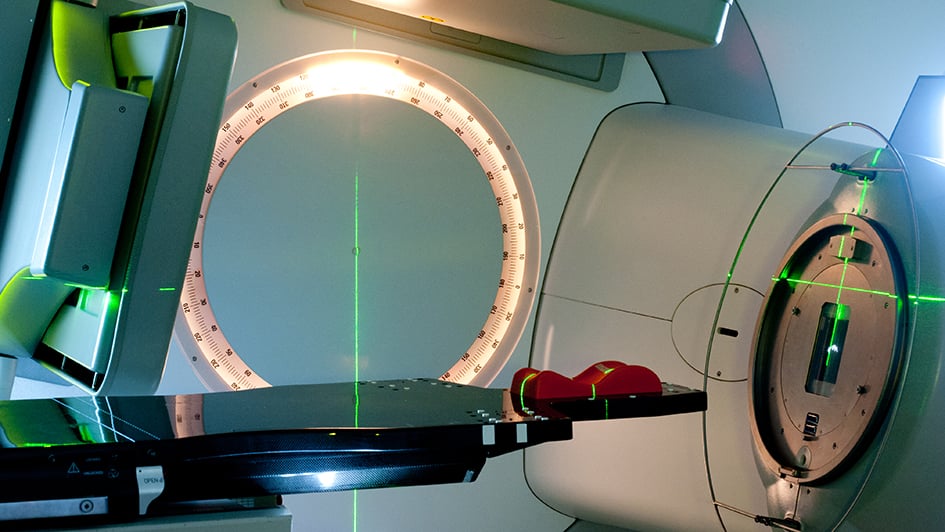Radiation Research Centre of Excellence (RadNet)

The Radiation Research Centre of Excellence (RadNet) at the ICR and The Royal Marsden brings together world-leading experts in radiotherapy, immunotherapy, cancer biology and targeted drug treatment to collaborate on new forms of combination treatment.

The Centre’s central goal is to link discovery, translational and clinical research with direct line of sight to patient benefit. Led by Professors Kevin Harrington and Nicholas van As, the Centre seeks to improve outcomes for cancer patients by understanding and modulating fundamental biological processes that occur in irradiated tumour and normal cells. In addition to biological effects, researchers will challenge dogma relating to physical concepts of radiotherapy delivery, particularly regarding spatial, dose-rate and dose-fractionation aspects of therapy.
The Centre is based on five preclinical and clinical research themes:
- Molecular responses to radiation-induced DNA damage
- Innate/adaptive immune responses
- Clinical translation
- Mechanisms of cell death
- Radiation delivery platforms
Research themes
1. Molecular responses to radiation-induced DNA damage
Led by Professor Jon Pines
RT-induced cell death mainly occurs through DNA damage in the form of double-strand breaks (DSBs). Differences between tumour and normal cells in their DSB repair responses are responsible for the clinical success of RT but, presently, we lack molecular insights to predict individual patient responses. Radiation responses must be considered both at the level of cancer cells and in the context of a complex tumour environment. In this theme, we draw on our expertise in genome stability to propose new research investigating cellular responses to RT, focussing on the effects of radiation on mitotic control/aneuploidy, genomic instability, double-strand break repair and cGAS/STING pathway.
2. Innate/adaptive immune responses
Led by Professor Kevin Harrington
This theme will build on our expertise in biological therapies to deliver new research to study RT-induced innate and adaptive immune responses focussing on three approaches: (i) the use of oncolytic viruses as modulators of RT-induced anti-tumour immunity; (ii) the use of non-viral activators of innate immune sensors; (iii) enhancing RT—induced immune responses with small-molecule modulators of molecular responses to radiation-induced DNA damage.
3. Clinical Translation
Led by Professor Nicholas van As
Our Centre supports dedicated research time for radiation oncologists to enable us to drive both forward and reverse translation from our other themes. We will conduct phase I studies of RT with line of sight to future trials powered for identified biological endpoints, including the delivery of novel sub-studies in patients taking part in national and international Royal Marsden-led RT trials to augment our understanding of biological markers of clinical response.
4. Mechanisms of Cell Death
Led by Professor Pascal Meier
Cells can die in many ways: some forms of death are immunogenic, others are immunologically silent or even tolerogenic. Immunogenic cell death (ICD) is not yet fully defined, but specific types of death (e.g. necroptosis) maximally drive antigen cross-priming of CD8+ T cells. This is because such programmes trigger cell death as well as NF-κB- and interferon-dependent production and release of ‘danger signals’ from dying cells that attract and stimulate immune cells. A central aim of this theme is to manipulate cell death and innate immune mechanisms so that RT maximally triggers cytotoxicity and the coordinated production of danger signals.
5. Radiation Delivery Platforms
Led by Professor Uwe Oelfke
Conventional radiotherapy (RT) dose-fractionation schedules are given at dose-rates around 0.03 Gy/s. Alternative approaches such as ultrahigh dose-rate radiotherapy (UHDR RT) deliver treatment at >40 Gy/s. The biological effects of UHDR RT remain uncharacterised but preclinical animal studies suggest impressive anti-tumour effects with reduced acute/late toxic effects. Microbeam radiotherapy (MBRT) is a radically new approach in which a homogeneous RT field is divided into planar high and low-dose regions on a micrometre scale. Pre-clinical evidence shows that MBRT effectively destroys tumours with limited damage to surrounding healthy tissues. The underlying radiobiological mechanisms of these effects are not understood at present. Our Centre aims to study and define the mechanistic bases for the biological effects of UHDR RT and MBRT with respect to molecular responses to DNA damage, tumour cell death and effects on innate and adaptive immune responses.